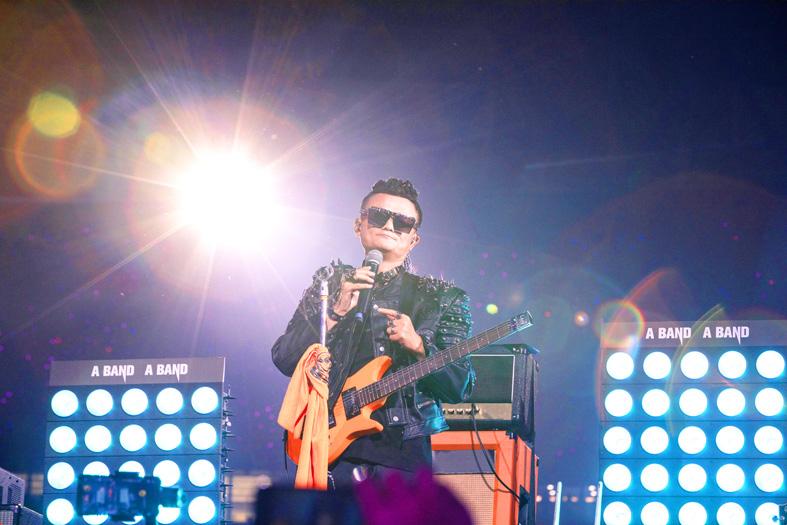Alibaba Group Holding Ltd (阿里巴巴) has moved a step closer toward getting expelled from US stock exchanges for US inspectors not being able to access financial audits.
The US Securities and Exchange Commission (SEC) on Friday added the largest US-listed Chinese company to a growing roster of firms that face removal because of Beijing’s refusal to permit US officials to review their auditors’ work.
The publication of the businesses’ names, which is required by a 2020 US law, starts a three-year clock to a final delisting.

Photo: EPA-EFE
The SEC’s move adds to a wall of worry for investors, who had been assessing myriad concerns including earnings risk, the effect of Alibaba cofounder Jack Ma (馬雲) reportedly ceding control of the firm’s fintech arm, Ant Group Co (螞蟻集團), and persistent COVID-19 lockdown risks in China.
Alibaba’s US-listed shares extended their declines for a third week and last month slumped 21 percent, its worst month since November last year.
Dozens of other countries permit the US audit inspections, giving its officials the go ahead to interview local accountants and scrutinize the documentation underlying their work. China and Hong Kong have refused, citing confidentiality laws and national security concerns.
With the clock ticking, Chinese firms including Alibaba and Kingsoft Cloud Holdings Ltd (金山雲網絡技術) earlier last week said they were seeking primary listings in Hong Kong, joining Bilibili Inc (嗶哩嗶哩) and Zai Lab Ltd (再鼎醫藥), which made the move earlier.
The switch could help companies tap more Chinese investors while providing a template for other US-listed Chinese firms that face delisting should Washington and Beijing fail to settle audit disputes.
A primary listing is a precursor to joining China’s Stock Connect program, which allows millions of mainland investors to directly buy stocks in Hong Kong. That frees up a large new pool of capital that might become especially crucial if China’s e-commerce leader gets delisted.
The SEC’s addition of firms from Alibaba to Pinduoduo Inc (拼多多) to its list following the publication of their annual financial statements for last year has jarred global investors.
Beijing has discussed with US regulators the logistics of allowing on-site audit inspections of Chinese companies listed in New York, Bloomberg News reported in April, spurring hopes for some kind of deal.
However, SEC Chair Gary Gensler has repeatedly said that it is unclear if US and Chinese authorities will come to an agreement.
Alibaba would be by far the largest Chinese company to get kicked off US bourses if regulators fail to strike a pact.
The company has argued that since its 2014 initial public offering in New York, its accounts have been audited by globally accepted accounting firms and should meet regulatory standards.
Last week, Gensler reiterated that Chinese and US officials need to reach a deal “very soon” for the next steps to take place to avoid a halt to the firms trading on US exchanges.

The Eurovision Song Contest has seen a surge in punter interest at the bookmakers, becoming a major betting event, experts said ahead of last night’s giant glamfest in Basel. “Eurovision has quietly become one of the biggest betting events of the year,” said Tomi Huttunen, senior manager of the Online Computer Finland (OCS) betting and casino platform. Betting sites have long been used to gauge which way voters might be leaning ahead of the world’s biggest televised live music event. However, bookmakers highlight a huge increase in engagement in recent years — and this year in particular. “We’ve already passed 2023’s total activity and

Nvidia Corp CEO Jensen Huang (黃仁勳) today announced that his company has selected "Beitou Shilin" in Taipei for its new Taiwan office, called Nvidia Constellation, putting an end to months of speculation. Industry sources have said that the tech giant has been eyeing the Beitou Shilin Science Park as the site of its new overseas headquarters, and speculated that the new headquarters would be built on two plots of land designated as "T17" and "T18," which span 3.89 hectares in the park. "I think it's time for us to reveal one of the largest products we've ever built," Huang said near the

China yesterday announced anti-dumping duties as high as 74.9 percent on imports of polyoxymethylene (POM) copolymers, a type of engineering plastic, from Taiwan, the US, the EU and Japan. The Chinese Ministry of Commerce’s findings conclude a probe launched in May last year, shortly after the US sharply increased tariffs on Chinese electric vehicles, computer chips and other imports. POM copolymers can partially replace metals such as copper and zinc, and have various applications, including in auto parts, electronics and medical equipment, the Chinese ministry has said. In January, it said initial investigations had determined that dumping was taking place, and implemented preliminary

Intel Corp yesterday reinforced its determination to strengthen its partnerships with Taiwan’s ecosystem partners including original-electronic-manufacturing (OEM) companies such as Hon Hai Precision Industry Co (鴻海精密) and chipmaker United Microelectronics Corp (UMC, 聯電). “Tonight marks a new beginning. We renew our new partnership with Taiwan ecosystem,” Intel new chief executive officer Tan Lip-bu (陳立武) said at a dinner with representatives from the company’s local partners, celebrating the 40th anniversary of the US chip giant’s presence in Taiwan. Tan took the reins at Intel six weeks ago aiming to reform the chipmaker and revive its past glory. This is the first time Tan